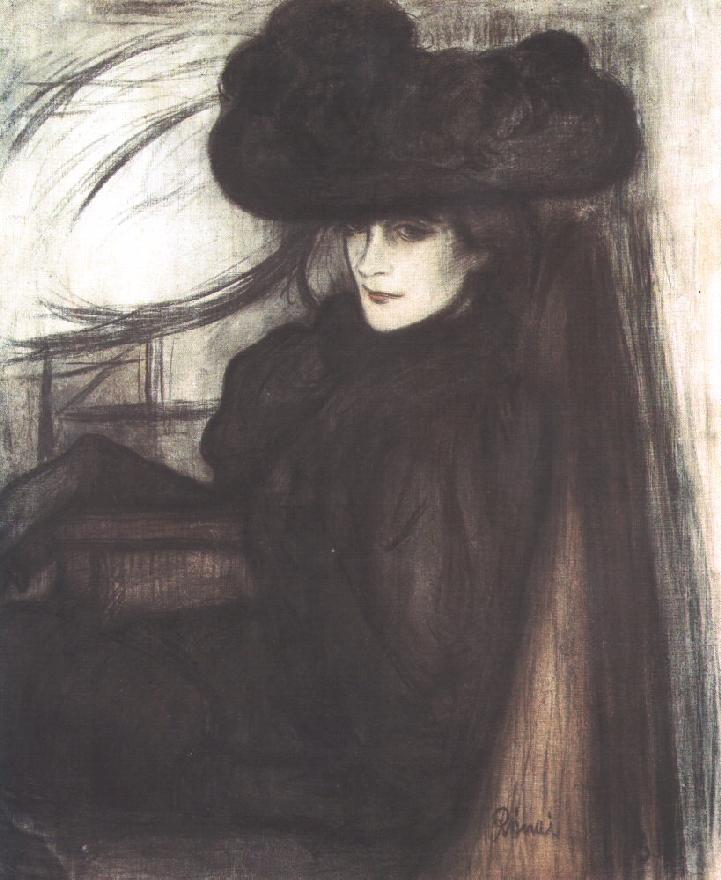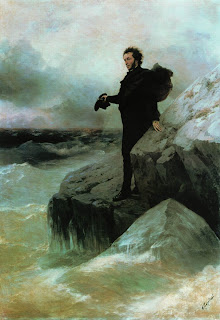The Minister's Black Veil
 Tuesday, April 12, 2016 at 10:39
Tuesday, April 12, 2016 at 10:39 The topic, it might be supposed, was obvious enough. There was the black veil swathed round Mr. Hooper's forehead and concealing every feature above his placid mouth, on which, at times, they could perceive the glimmering of a melancholy smile. But that piece ... to their imagination, seemed to hang down before his heart, the symbol of a fearful secret between him and them. Were the veil but cast aside, they might speak freely of it, but not till then. Thus they sat a considerable time, speechless, confused and shrinking uneasily from Mr. Hooper's eye, which they felt to be fixed upon them with an invisible glance.
 In a previous life – or twenty-two years ago, which was definitely another life of sorts – I was forcibly subjected to the dismal science and its web of incongruities, a maze with a monster in the middle but neither egress nor ingress. This was a dull time no shinier in retrospect. Readers of these pages are duly aware of my attitude towards the accumulation of riches while millions are never given the chance to live on subsistence, and twenty some years ago my opinions were but cygnets compared to the majestic bird who now swims unmolested on my autumn lake. Yet my opinions were already formed. Economics may not only involve the pursuit of money or wealth, but that is ultimately what gears its engine, just like the pursuit of physical satisfaction will always be captained by something that cannot be love. Few actually study economics to help the victims of inequality; most either want money or the authority to direct the policy of money (look no further than the pandemic fraud of Marxism-Leninism), which ends up corrupting them just as much as absolute power. No, most people who like to talk about money – even theoretically – will sooner or later love money itself and use it as a barometer to measure public happiness as well as their own. Some even say that the loss of something valuable can lead to economic stimulation, a horrific fallacy that was most famously coined in a work by a French theoretician. Behind the broken window, however, lies another human event, namely that some of us will catch ourselves smiling at the misfortune of others – not only because of the worst of human emotions, Schadenfreude, but also because in their failures we espy our opportunities. The services of some citizens may indeed gain in demand from rectifying the woes of others; but over time there lurks the possibility that they may begin to wish for misfortune so that they might profit. And to those who enjoy watching others struggle and fail, financial and emotional distress can be similarly beneficial, a point made in this fine parable.
In a previous life – or twenty-two years ago, which was definitely another life of sorts – I was forcibly subjected to the dismal science and its web of incongruities, a maze with a monster in the middle but neither egress nor ingress. This was a dull time no shinier in retrospect. Readers of these pages are duly aware of my attitude towards the accumulation of riches while millions are never given the chance to live on subsistence, and twenty some years ago my opinions were but cygnets compared to the majestic bird who now swims unmolested on my autumn lake. Yet my opinions were already formed. Economics may not only involve the pursuit of money or wealth, but that is ultimately what gears its engine, just like the pursuit of physical satisfaction will always be captained by something that cannot be love. Few actually study economics to help the victims of inequality; most either want money or the authority to direct the policy of money (look no further than the pandemic fraud of Marxism-Leninism), which ends up corrupting them just as much as absolute power. No, most people who like to talk about money – even theoretically – will sooner or later love money itself and use it as a barometer to measure public happiness as well as their own. Some even say that the loss of something valuable can lead to economic stimulation, a horrific fallacy that was most famously coined in a work by a French theoretician. Behind the broken window, however, lies another human event, namely that some of us will catch ourselves smiling at the misfortune of others – not only because of the worst of human emotions, Schadenfreude, but also because in their failures we espy our opportunities. The services of some citizens may indeed gain in demand from rectifying the woes of others; but over time there lurks the possibility that they may begin to wish for misfortune so that they might profit. And to those who enjoy watching others struggle and fail, financial and emotional distress can be similarly beneficial, a point made in this fine parable.

An excessively candid title does not detract from the vitality of the introduction, whereby we become acquainted with a young, unmarried sexton by the name of Hooper. Hooper is well-liked in his small community both for his humor and his mildness, and seems to exemplify at least in his words what the Puritan methodology on the enjoyment of life and our destination upon corporeal extinction might entail. His ostensible piety mitigates his choice one day to don a veil, an act that confounds his parishioners:
On a nearer view [the veil] seemed to consist of two folds of crape, which entirely concealed his features, except the mouth and chin, but probably did not intercept his sight, further than to give a darkened aspect to all living and inanimate things. With this gloomy shade before him, good Mr. Hooper walked onward, at a slow and quiet pace, stooping somewhat, and looking on the ground, as is customary with abstracted men, yet nodding kindly to those of his parishioners who still waited on the meeting-house steps.
It is this "darkened aspect" that hints at those deeds to which we cannot be privy. Hooper's appearance at the pulpit is taken as part of his guise as preacher, as the presence he must possess to sway his constituents into the good and the favor of the Almighty. Hooper talks and all are enthralled because he seems to have pierced their consciences, derived from their darkest caverns the toils of their compunction, and encased them all behind his veil as if the veil itself were a box of sins to be fastened for eternity – or maybe a bit less than that. Yet his own misery makes him the subject of idle chatter, and those whose minds might indeed be plagued by something or someone see in him a worse version of themselves. And despite the uncertainty of his intentions (Hooper never quite explains what is gnawing at him) and the wickedness around their world, they cannot help but smile.
This uncertainty is augmented by the story's finest scene, and one of the finest in nineteenth-century literature, the subsequent funeral of a young woman. Hooper is expected to appear to send the departed on her way. But his actions, unquestioned for the most part by the mourners, cannot be deemed ordinary:
The clergyman stepped into the room where the corpse was laid, and bent over the coffin, to take a last farewell of his deceased parishioner. As he stooped, the veil hung straight down from his forehead, so that, if her eyelids had not been closed forever, the dead maiden might have seen his face. Could Mr. Hooper be fearful of her glance, that he so hastily caught back the black veil? A person who watched the interview between the dead and living, scrupled not to affirm, that, at the instant when the clergyman's features were disclosed, the corpse had slightly shuddered, rustling the shroud and muslin cap, though the countenance retained the composure of death. A superstitious old woman was the only witness of this prodigy.
One would guess that it is important that the only witness is both old and beset by the tall tales of more simple souls. Yet the matter is elucidated shortly thereafter by a couple in the procession:
"Why do you look back?" said one in the procession to his partner.
"I had a fancy," replied she, "that the minister and the maiden's spirit were walking hand in hand."
"And so had I, at the same moment," said the other.
We are given only one more aspersion against the pastor's character, and it comes from yet another woman. Upon learning of the ineptitude of local representatives tasked with discovering the truth behind Hooper's apparent self-castigation, a woman named Elizabeth, called the sexton's "lover" yet for the time being just a candidate for marriage, approaches the man of the cloth with halfhearted curiosity. Elizabeth is not baffled by Hooper, yet neither is she without fear. Fear, one should add, of knowing enough of the truth to guess the rest as if at the threshold of an ancient manor an indefinite series of parallel doors opened to reveal, at their end, one's most hideous apprehension. There were, she intimates, "rumors already abroad in the village," but these rumors are expressed only in the "color [that] rose in her cheeks." Hooper does not confirm or deny any of her insinuations, preferring to lift his veil only in death. Elizabeth leaves and we understand that, although still young, he has forsaken his last chance for companionship in this world.
Hawthorne's works come in two forms: excellent and riveting, and excellent and bland. The blander works may still find their way onto high school curricula and can invariably be praised for their locution and elegance; but his riveting works cannot be praised enough. For reasons not unrelated to this astounding work of genius, the plight of our veiled sexton has endured among Hawthorne's most read short stories and can be used on opposing sides of argumentation, especially given the delightful but not unsurprising dénouement. What argumentation, you might ask? Consider the sexton's first address to Elizabeth: "There is an hour to come when all of us shall cast aside our veils." And at that hour a dark box may or may not be unfastened for all to see, however thick our camouflage was on earth.



